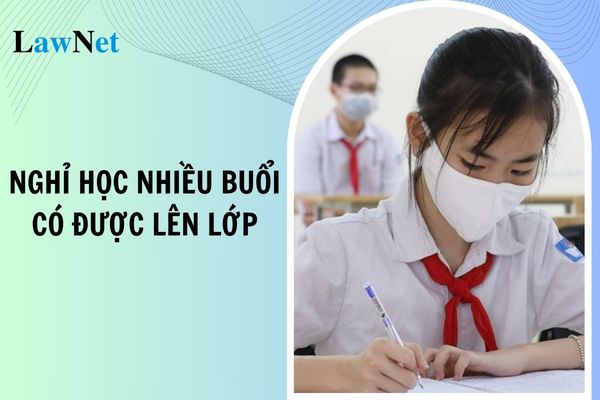Are lower secondary school students in Vietnam, who are frequently absent for volunteering purposes, eligible for advance to next grade?
Are lower secondary school students in Vietnam, who are frequently absent for volunteering purposes, eligible for advance to next grade?
Based on Point c, Clause 1, Article 12 of Circular 22/2021/TT-BGDDT:
Allowed to Advance to the Next Grade, Evaluation during Summer Vacation, Not Allowed to Advance to the Next Grade
- Students meeting the following conditions are allowed to advance to the next grade or are recognized as having completed the lower secondary or upper secondary education programs:
a) The year's discipline results (including re-evaluation results after retraining during summer vacation as specified in Article 13 of this Circular) must be at a satisfactory level or higher.
b) The year's academic performance (including re-evaluation results for subjects as specified in Article 14 of this Circular) must be at a satisfactory level or higher.
c) Absences must not exceed 45 days in a school year (calculated according to the educational plan of 1 session/day as prescribed in the National Education Program, including both excused and unexcused absences, whether continuous or non-continuous).
- In cases where students must retrain during the summer vacation, the provisions of Article 13 of this Circular apply; students who need to retake examinations or have their subjects re-evaluated during the summer vacation, the provisions of Article 14 of this Circular apply.
- Students who do not meet the requirements as specified in Clause 1 of this Article are not allowed to advance to the next grade or are not recognized as having completed the lower secondary or upper secondary education programs.
- For students with disabilities: The principal bases on the evaluation results of students with disabilities as specified in Article 11 of this Circular to consider advancing them to the next grade or recognizing the completion of lower secondary or upper secondary education programs for students with disabilities.
Therefore, even if the reason is volunteering, if a student has more than 45 absences in a school year (calculated according to the educational plan of 1 session/day as prescribed in the National Education Program, including both excused and unexcused absences, whether continuous or non-continuous), they are not allowed to advance to the next grade.

Are lower secondary school students in Vietnam, who are frequently absent for volunteering purposes, eligible for advance to next grade? (Image from the Internet)
What are the current methods of student assessment in lower secondary schools in Vietnam?
Based on Article 5 of Circular 22/2021/TT-BGDDT:
Form of Evaluation
- Evaluation by Comment
a) Teachers use verbal or written forms to comment on students’ accomplishments in their training and studies; comment on students' progress, standout advantages, and major limitations; evaluate students' training and academic outcomes.
b) Students use verbal or written forms to self-comment on their accomplishments in training and studies, progress, standout advantages, and major limitations of themselves.
c) Parents, agencies, organizations, or individuals involved in the students' education provide feedback on the students' accomplishments in training and studies.
d) Evaluation by comment of students’ training and academic outcomes is used in regular evaluation and periodic evaluation through various forms of testing, compatible with the peculiarities of the subject.
- Evaluation by Grade
a) Teachers use grades to evaluate students' training and academic outcomes.
b) Evaluation by grade is used in regular evaluation and periodic evaluation through various forms of testing, compatible with the peculiarities of the subject.
- Evaluation Method for Subjects
a) Evaluation by comment for subjects such as Physical Education, Arts, Music, Fine Arts, Local Educational Content, Experiential Activities, and Career Orientation; learning outcomes by subject are evaluated by comment as either Pass or Not Pass.
b) Evaluation by comment combined with grading for subjects within the National Education Program, excluding those mentioned in point a of this clause; academic outcomes by subject are evaluated by grade on a 10-point scale, and if another scale is used, it must be converted to a 10-point scale. The evaluation score is an integer or decimal taken to the first decimal place after rounding.
Currently, there are evaluation methods for lower secondary students such as Evaluation by Comment and Evaluation by Grade.
For subjects like Physical Education, Arts, Music, Fine Arts, Local Educational Content, Experiential Activities, and Career Orientation, students’ learning outcomes are evaluated by comment as either Pass or Not Pass.
For remaining subjects, they are evaluated by comment combined with grading.
Do lower secondary students in Vietnam have to do mid-semester exam on paper?
Based on Clause 1, Article 7 of Circular 22/2021/TT-BGDDT:
Periodic Evaluation
- Periodic evaluation (not applicable to a group of thematic studies) includes mid-semester and end-semester evaluations, conducted through: tests (on paper or computer), practical exercises, or learning projects.
- The duration for tests (on paper or computer) for subjects (excluding thematic study groups) with up to 70 lessons per year is 45 minutes, for subjects with more than 70 lessons per year, it ranges from 60 to 90 minutes; for specialized subjects, a maximum of 120 minutes.
- For tests (on paper or computer) evaluated by grade, the test is constructed based on a matrix and blueprint of the test, meeting the requirements of the subject as prescribed in the National Education Program.
- For tests (on paper or computer) evaluated by comment, practical exercises, or learning projects, guidelines and evaluation criteria following the required standards of the subject as prescribed in the National Education Program must be provided before execution.
...
Thus, periodic evaluation (not applicable to a group of thematic studies), including mid-semester and end-semester evaluations, is conducted through: tests (on paper or computer), practical exercises, or learning projects. Therefore, tests can be done on a computer instead of on paper.

